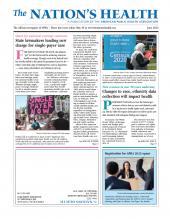
For more healthy travel tips, visit www.cdc.gov/travel
Photo by Vgajic, courtesy iStockphoto
You circled the dates on your calendar months ago, and now it’s finally time — vacation! Your playlist is ready to roll and you’re itching to get on the road. Maybe you’re heading to the mountains, the theme park or a fast-paced city. Or perhaps you’re off to explore foreign lands.
Wherever your travels lead you, studies show that taking a vacation is important for your mental and physical health. But keep in mind that too much fun can be bad for your health.
Vacations allow us to loosen the reins a bit and take a break from our normal routines. That means we have new adventures, try new foods, sip on drinks with little paper umbrellas and explore new places. Vacations are good for us, says Brooks Gump, PhD, MPH, who has studied the effect of vacations on our health.
“Not having an actual vacation year-to-year is associated with an increased risk in mortality,” says Gump, a public health researcher at Syracuse University.
But wherever you’re headed, Gump advises easing in to your vacation. Studies show that people prone to heart disease are at an increased risk of having a heart attack within the first two days of arriving at their destination.
The risk is likely related to vacation travel stressors combined with unfamiliar surroundings, which can also increase your risk of injuries, he says.
“The best recommendation is to take it easy the first couple days until you’re acclimated,” he says.
And along with that, don’t be afraid to pull the plug on work. Your mental health will thank you.
“Ideally they can’t even reach you — you are out-of-pocket completely,” Gump says. “That will allow you to truly relax because there’s no way they can get ahold of you.”
Pack your better judgment
Ready for your vacation? Have fun, but don’t take a break from common sense.
Vacationers can sometimes indulge in things they haven’t tried before, like ziplining, skydiving or deep-sea diving. That can be exciting, but no matter what kind of recreational activity you try, listen to safety instructions and follow the rules.
That means if you’re on the water, make sure to wear a life jacket. If you’ll be traveling by car, take it in for an inspection before hitting the road. Traveling with children? Make sure they’re buckled up in age- and size-appropriate car seats, booster seats or seat belts. Will your plans include bicycles or motorbikes? Great, but helmets are just as vital on vacation as they are at home.
It’s also important to know the risks of the places you’re visiting. If you’re vacationing on an island or coast, look up hurricane and tsunami risks and ask about evacuation routes.
If you’re heading for a hike in the woods, check the weather and wildfire forecast and tell someone where you’re going.
Taking the time to be careful can mean the difference between spending your vacation relaxing under a beach umbrella or lying in a hospital bed.
Try not to overindulge
Stepping away from the everyday can mean less healthy meals, interrupted sleep routines and skipped exercise.
If you’re just bending your rules for just a little while, it shouldn’t make too much of a difference in the long run. Just be sure not to go overboard, advises women’s health coach and dietitian Brigitte Zeitlin, MPH, RD, CDN. A less-healthy you isn’t one of the souvenirs you want to bring home from your vacation. Here are some tips that can help you stay healthy on your time off:
Don’t forget to hydrate. Besides making you feel better, it can help with constipation issues that many people have when traveling.
Find the veggies: “I promise there are veggies on all those menus,” Zeitlin says. “Look for ways you can add them into your meals as an appetizer or side dish.”
Eat your starchier, heavier or bigger meal for lunch and make dinner more protein- and veggie-focused.
Mind your alcohol intake. You don’t want to miss that once-in-a-lifetime sunrise because you’ve overimbibed.
Watch your step. Falls and trips are some of the most common vacation injuries. Pack comfortable, sturdy shoes and pay attention to where you’re going.
Keep things active. “Add in movement whenever you can,” Zeitlin says. If you’re in a city, walk from place to place — make it fun and track your steps. If you’re on a beach, go for long walks during the day, and add in some swimming. If your resort offers yoga, try it out. If the area is bike-friendly, rent a bike for an afternoon or day.
“There are so many ways to work in movement on vacation that have nothing to do with the gym,” Zeitlin says. “And finally, have fun, take lots of pictures and be in the moment.”
- Copyright The Nation’s Health, American Public Health Association









